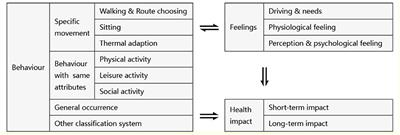EDITORIAL
Published on 04 Jan 2023
Editorial: The built environment and public health: New insights
doi 10.3389/fpubh.2022.1079182
- 2,092 views
- 3 citations
49k
Total downloads
222k
Total views and downloads
You will be redirected to our submission process.
EDITORIAL
Published on 04 Jan 2023
REVIEW
Published on 09 Sep 2022

ORIGINAL RESEARCH
Published on 05 Aug 2022

ORIGINAL RESEARCH
Published on 24 Jun 2022

ORIGINAL RESEARCH
Published on 31 May 2022

ORIGINAL RESEARCH
Published on 11 May 2022

ORIGINAL RESEARCH
Published on 10 May 2022

ORIGINAL RESEARCH
Published on 09 May 2022

SYSTEMATIC REVIEW
Published on 06 May 2022

ORIGINAL RESEARCH
Published on 02 May 2022

ORIGINAL RESEARCH
Published on 29 Apr 2022

ORIGINAL RESEARCH
Published on 28 Apr 2022

